
Felix Dahle
PhD Student in the Geoscience & Remote Sensing Group at TU Delft.
I joined the group in March 2021 and I am supervised by Bert Wouters and Roderik
Lindenbergh.
My research interests are in the fields of Geo-informatics, Computer Vision, Photogrammetry and Machine
Learning.
I obtained a Master degree in Geomatics at TU Delft, during which I worked as a developer
for Readar.
Current Research
My PhD research is focused on historical changes of Antarctic glaciers from photogrammetry: I am studying
historical aerial imagery from the Antarctic continent in order to derive historical DEMs.
These models will be compared with present day elevation data to obtain a detailed picture of elevation and mass
changes over the past 50 years.
In this way the long-term response of the Antarctic Peninsula to changing climate conditions and ice shelf
thinning can be studied.
Publications
-
Polar perspectives: a deep dive into geo-referencing historical Antarctic photos
Felix Dahle, Bert Wouters, Roderik Lindenbergh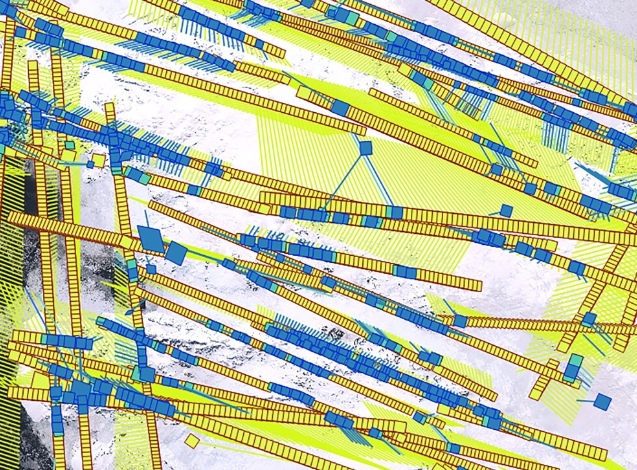 We developed a workflow to geo-reference historical aerial imagery with a use-case on the Antarctic Peninsula. Using modern algorithms for tie-point matching (LightGlue), we can find similar points on the historic images and modern Sentinel-2 imagery and use these points for geo-referencing. A special focus in this paper is the tie-point matching, which was adapted to work with historical and large imagery.International Journal of Digital Earth
We developed a workflow to geo-reference historical aerial imagery with a use-case on the Antarctic Peninsula. Using modern algorithms for tie-point matching (LightGlue), we can find similar points on the historic images and modern Sentinel-2 imagery and use these points for geo-referencing. A special focus in this paper is the tie-point matching, which was adapted to work with historical and large imagery.International Journal of Digital Earth@article{dahle_georef_2024, author = {Felix Dahle, Roderik Lindenbergh and Bert Wouters}, title = {Polar perspectives: a deep dive into geo-referencing historical Antarctic photos}, journal = {International Journal of Digital Earth}, volume = {17}, number = {1}, pages = {2406384}, year = {2024}, publisher = {Taylor \& Francis}, doi = {10.1080/17538947.2024.2406384}, URL = {https://doi.org/10.1080/17538947.2024.2406384}, eprint = {https://doi.org/10.1080/17538947.2024.2406384} } -
Revisiting the Past: A comparative study for semantic segmentation of historical images of Adelaide Island using U-nets
Felix Dahle, Bert Wouters, Roderik Lindenbergh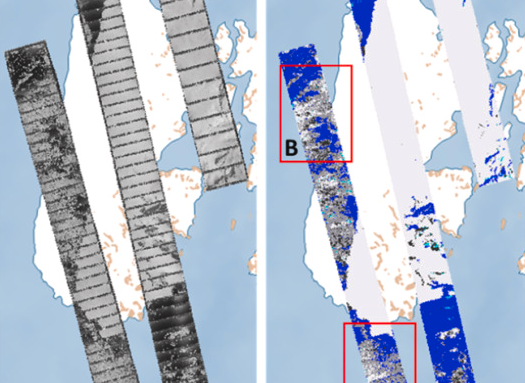 Building on the previous article we are extening the semantic segmentation of historical photographs of the Antarcitca using U-nets. We compare multiple hyper-parameters and augmentation methods to identify the optimal settings for a segmentation of Adelaide Island.ISPRS Open Journal of Photogrammetry and Remote Sensing
Building on the previous article we are extening the semantic segmentation of historical photographs of the Antarcitca using U-nets. We compare multiple hyper-parameters and augmentation methods to identify the optimal settings for a segmentation of Adelaide Island.ISPRS Open Journal of Photogrammetry and Remote Sensing@article{DAHLE2024100056, title = {Revisiting the Past: A comparative study for semantic segmentation of historical images of Adelaide Island using U-nets}, journal = {ISPRS Open Journal of Photogrammetry and Remote Sensing}, volume = {11}, pages = {100056}, year = {2024}, issn = {2667-3932}, doi = {https://doi.org/10.1016/j.ophoto.2023.100056}, url = {https://www.sciencedirect.com/science/article/pii/S2667393223000273}, author = {Felix Dahle and Roderik Lindenbergh and Bert Wouters}, } -
Semantic segmentation of historical photographs of the Antarctic Peninsula
Felix Dahle, Julian Tanke, Bert Wouters, Roderik Lindenbergh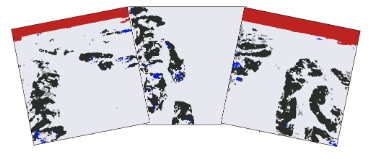 Semantic segmentation is applied to historical photographs of the Antarctica using a U-net based machine learning approach. Our results show that our method can handle very challenging images even after being trained with only a low number of training data and catch the general semantic meaning of a scene.XXIVth ISPRS Congress 2022 (Nice, France)
Semantic segmentation is applied to historical photographs of the Antarctica using a U-net based machine learning approach. Our results show that our method can handle very challenging images even after being trained with only a low number of training data and catch the general semantic meaning of a scene.XXIVth ISPRS Congress 2022 (Nice, France)@Article{isprs-annals-V-2-2022-237-2022, AUTHOR = {Dahle, F. and Tanke, J. and Wouters, B. and Lindenbergh, R.}, TITLE = {SEMANTIC SEGMENTATION OF HISTORICAL PHOTOGRAPHS OF THE ANTARCTICA PENINSULA}, JOURNAL = {ISPRS Annals of the Photogrammetry, Remote Sensing and Spatial Information Sciences}, VOLUME = {V-2-2022}, YEAR = {2022}, PAGES = {237--244}, URL = {https://www.isprs-ann-photogramm-remote-sens-spatial-inf-sci.net/V-2-2022/237/2022/}, DOI = {10.5194/isprs-annals-V-2-2022-237-2022} } -
Automatic change detection of digital maps using aerial images and point clouds
Felix Dahle, Ken Aroyo Ohori, Giorgio Agugiaro, Sven Briels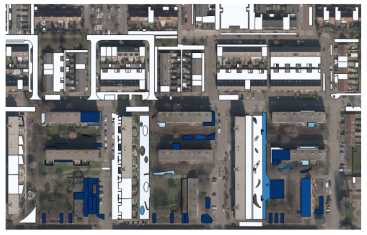 In this work we are showing that random-forest based approaches can be used to detect changes between two time steps using 2.5D data and to transfer these insights to a digital map. Results show that this methodology can recognize a substantial amount of changes and can support - and speed up - the manual updating processXXIVth ISPRS Congress 2021 (Virtual)
In this work we are showing that random-forest based approaches can be used to detect changes between two time steps using 2.5D data and to transfer these insights to a digital map. Results show that this methodology can recognize a substantial amount of changes and can support - and speed up - the manual updating processXXIVth ISPRS Congress 2021 (Virtual)@Article{isprs-archives-XLIII-B2-2021-457-2021, AUTHOR = {Dahle, F. and Arroyo Ohori, K. and Agugiaro, G. and Briels, S.}, TITLE = {AUTOMATIC CHANGE DETECTION OF DIGITAL MAPS USING AERIAL IMAGES AND POINT CLOUDS}, JOURNAL = {The International Archives of the Photogrammetry, Remote Sensing and Spatial Information Sciences}, VOLUME = {XLIII-B2-2021}, YEAR = {2021}, PAGES = {457--464}, URL = {https://www.int-arch-photogramm-remote-sens-spatial-inf-sci.net/XLIII-B2-2021/457/2021/}, DOI = {10.5194/isprs-archives-XLIII-B2-2021-457-2021} } -
CITYJSON + WEB = NINJA
Stelios Vitalis, Anna Labetski, Freek Boersma, Felix Dahle, Xiaoa Li, Ken Arroyo Ohori, Hugo Ledoux, Jantien Stoter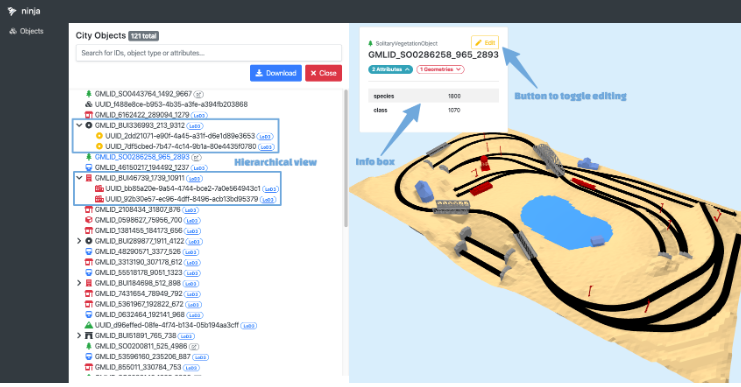 3D city models would greatly benefit from a proper web-based solution to visualise and manage them. In order to provide an implementation of a web application for CityJSON data, that can be used as a reference for other applications, we developed ninja. It is a web application that allows the user to easily load and investigate a CityJSON model through a web browser.XXIVth ISPRS Congress 2020 (Virtual)
3D city models would greatly benefit from a proper web-based solution to visualise and manage them. In order to provide an implementation of a web application for CityJSON data, that can be used as a reference for other applications, we developed ninja. It is a web application that allows the user to easily load and investigate a CityJSON model through a web browser.XXIVth ISPRS Congress 2020 (Virtual)@Article{isprs-annals-VI-4-W1-2020-167-2020, AUTHOR = {Vitalis, S. and Labetski, A. and Boersma, F. and Dahle, F. and Li, X. and Arroyo Ohori, K. and Ledoux, H. and Stoter, J.}, TITLE = {CITYJSON + WEB = NINJA}, JOURNAL = {ISPRS Annals of the Photogrammetry, Remote Sensing and Spatial Information Sciences}, VOLUME = {VI-4/W1-2020}, YEAR = {2020}, PAGES = {167--173}, URL = {https://www.isprs-ann-photogramm-remote-sens-spatial-inf-sci.net/VI-4-W1-2020/167/2020/}, DOI = {10.5194/isprs-annals-VI-4-W1-2020-167-2020} } -
Europe's socio-economic disparities reflected in settlement patterns derived from satellite data
Hannes Taubenböck, Felix Dahle, Christian Geiß, Michael Wurm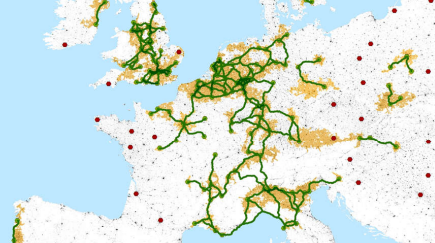 In this work we detect urban nodes as anchor points of urban densification. We identify a network of cities when conjugation lines between these urban nodes feature high settlement density. Further, we map regions around connected urban nodes with high settlement densities. We assume that these identified regions belonging to a network of cities express beneficial economic development.JURSE 2019 (Vannes, France)
In this work we detect urban nodes as anchor points of urban densification. We identify a network of cities when conjugation lines between these urban nodes feature high settlement density. Further, we map regions around connected urban nodes with high settlement densities. We assume that these identified regions belonging to a network of cities express beneficial economic development.JURSE 2019 (Vannes, France)@INPROCEEDINGS{8809033, author={Taubenböck, Hannes and Dahle, Felix and Geiß, Christian and Wurm, Michael}, booktitle={2019 Joint Urban Remote Sensing Event (JURSE)}, title={Europe's socio-economic disparities reflected in settlement patterns derived from satellite data}, year={2019}, volume={}, number={}, pages={1-4}, doi={10.1109/JURSE.2019.8809033} }